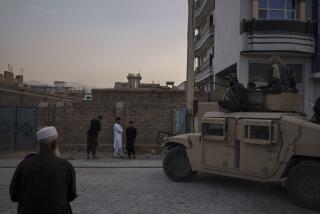U.S. changes approach to pressing Pakistan on Haqqani network
- Share via
Reporting from Islamabad, Pakistan — Faced with Pakistan’s unwillingness to uproot the Haqqani network from its territory, Washington is now pressing Islamabad to force the Afghan insurgent group to join peace talks, U.S. Secretary of State Hillary Rodham Clinton suggested Friday.
Clinton stressed, however, that if Pakistan doesn’t move quickly, the United States would be forced to act unilaterally against Haqqani safe havens in Pakistani territory. Putting American boots on the ground is not a serious option, she added, but she did not specify what action the U.S. would take.
While the U.S. would still welcome a Pakistani military operation against Haqqani militants in the country’s lawless tribal areas, remarks made by Clinton at a town hall meeting in Islamabad suggested that Washington had narrowed its expectations.
Asked by a Pakistani journalist whether the U.S. expected Pakistan to attack Haqqani militants or force the group’s leaders to negotiate, Clinton answered, “It’s more the latter.”
“We think for a variety of reasons that Pakistan has the capacity to encourage, to push, to squeeze … terrorists, including the Haqqanis and the Afghan Taliban, … to engage in the Afghan peace process,” she said. “So that is what we are looking for.”
Clinton’s remarks appeared to signal a recognition of Pakistan’s long-standing resistance to military action against the Haqqani network in North Waziristan, the tribal region along the Afghan border that Washington has long said is used by Haqqani militants as a springboard for attacks on U.S., NATO and Afghan troops in Afghanistan.
Pakistan says it cannot launch a military assault on Haqqani militants because thousands of its troops are already deployed against the country’s homegrown insurgency, the Pakistani Taliban and other militant groups.
However, experts in both Washington and Pakistan believe the military hesitates to attack Haqqani militants because the country’s intelligence community has strong ties with it, and because it sees the group as a valuable asset in Afghanistan once U.S. troops withdraw by the end of 2014.
U.S. allegations of Pakistan’s backing of Haqqani militants were crystallized in blunt accusations made by Adm. Michael G. Mullen last month, just before he stepped down as chairman of the U.S. Joint Chiefs of Staff. Mullen called the Haqqani network “a veritable arm” of Pakistan’s premier spy agency, the Inter-Services Intelligence directorate, and alleged ISI involvement in suspected Haqqani attacks last month on the U.S. Embassy and the headquarters of the North Atlantic Treaty Organization force in Kabul, in which 16 Afghans were killed, and on an American base in Wardak province that left 77 U.S. troops wounded.
Clinton, CIA Director David H. Petraeus and the new head of the Joint Chiefs, Gen. Martin E. Dempsey, traveled to Pakistan this week in a high-profile effort to force its leadership to take on the Haqqani network. Pakistani officials this week characterized the U.S. approach as contradictory: pressing the group militarily while trying to entice it to negotiate.
At a joint news conference with Clinton, Pakistani Foreign Minister Hina Rabbani Khar rejected claims that any element of the Pakistani government supported the Haqqani network or allowed the group to maintain safe havens.
At the same time, she endorsed the idea of Pakistan playing a strong role in Afghan-led peace talks with the Haqqani network and the Afghan Taliban.
“Pakistan has worked on this, and is ready to support a reconciliation process that is good for the Afghan people,” Khar said. “We are committed to this process, and willing to do whatever we can to make it a success.”
Clinton’s public remarks suggested that Washington was prepared to give Pakistan some leeway on how to prevent future Haqqani attacks in Afghanistan, but she stressed the urgency of the problem.
“We should be able to agree that for too long extremists have been able to operate here in Pakistan and from Pakistani soil,” Clinton said during the news conference. “No one who targets innocent civilians, whether they be Pakistanis, Afghans, Americans or anyone else, should be tolerated or protected.”
Acknowledging that intelligence agencies commonly maintain contacts with insurgent groups, Clinton told Pakistani journalists that the ISI should use its links with the Haqqani network to try to bring it to the negotiating table. She added that it was the ISI that arranged a meeting between a Haqqani member and an American team this year.
More to Read
Sign up for Essential California
The most important California stories and recommendations in your inbox every morning.
You may occasionally receive promotional content from the Los Angeles Times.










